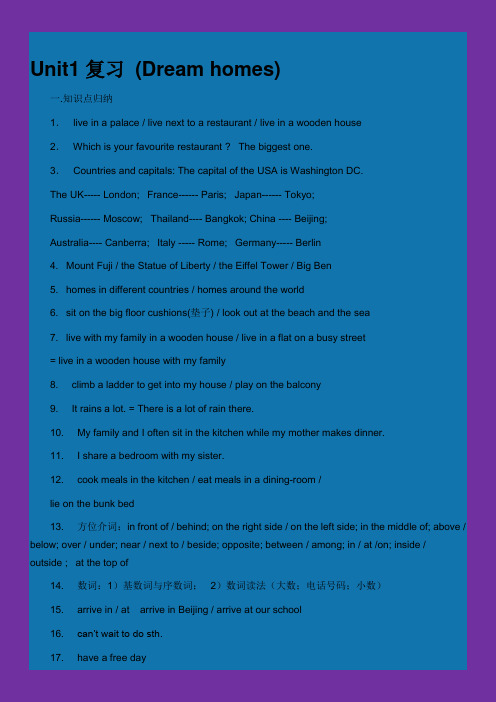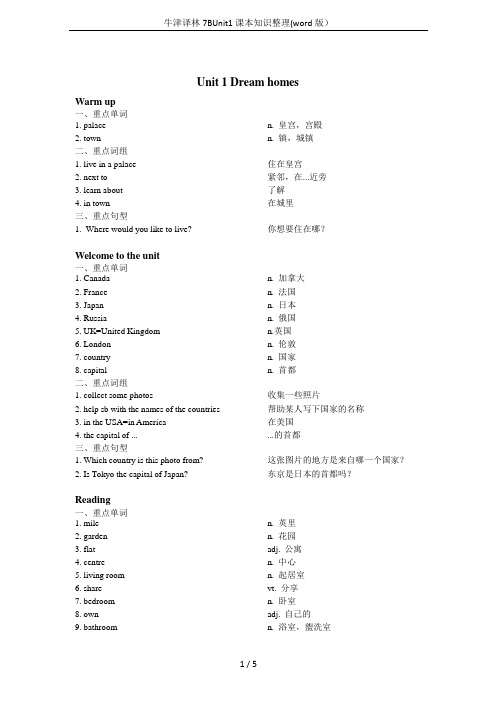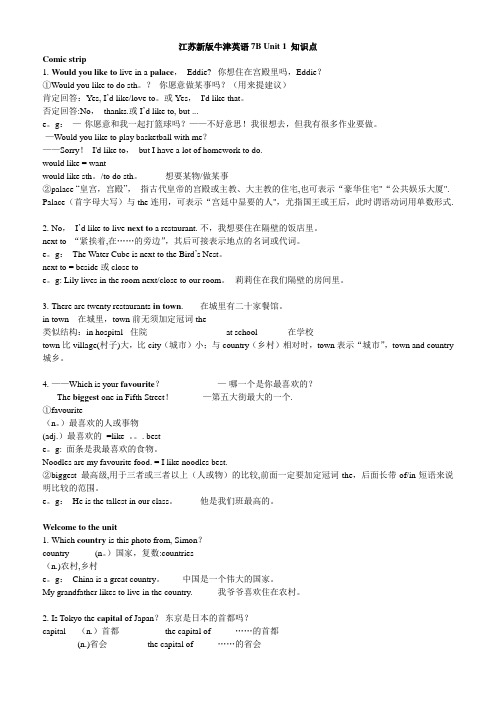(完整版)江苏新版牛津英语7B-Unit-1-知识点,推荐文档
江苏新版牛津英语7B-Unit-1-知识点

江苏新版牛津英语7B Unit 1 知识点Comic strip1.Would you like to live in a palace, Eddie? 你想住在宫殿里吗,Eddie?①Would you like to do sth.?你愿意做某事吗?(用来提建议)肯定回答:Yes, I’d like/love to.或Yes, I'd like that。
否定回答:No, thanks。
或I’d like to, but 。
.e。
g:-—你愿意和我一起打篮球吗?——不好意思!我很想去,但我有很多作业要做。
--Would you like to play basketball with me?——Sorry! I’d like to, but I have a lot of homework to do。
would like = wantwould like sth。
/to do sth. 想要某物/做某事②palace “皇宫,宫殿”,指古代皇帝的宫殿或主教、大主教的住宅,也可表示“豪华住宅"“公共娱乐大厦”。
Palace(首字母大写)与the连用,可表示“宫廷中显要的人",尤指国王或王后,此时谓语动词用单数形式。
2.No,I’d like to live next to a restaurant. 不,我想要住在隔壁的饭店里.next to “紧挨着,在……的旁边",其后可接表示地点的名词或代词。
e.g: The Water Cube is next to the Bird’s Nest.next to = beside或close toe.g: Lily lives in the room next/close to our room。
莉莉住在我们隔壁的房间里。
3.There are twenty restaurants in town. 在城里有二十家餐馆。
江苏新版牛津英语7B-Unit-1-知识点

江苏新版牛津英语7B Unit 1 知识点ic strip1.Would you like to live in a palace, Eddie? 您想住在宫殿里吗,Eddie?①Would you like to do sth、? 您愿意做某事吗?(用来提建议)肯定回答:Yes, I’d like/love to、或Yes, I’d like that、否定回答:No, thanks、或I’d like to, but 、、、e、g: --您愿意与我一起打篮球吗?--不好意思!我很想去,但我有很多作业要做。
--Would you like to play basketball with me?--Sorry! I’d like to, but I have a lot of homework to do、would like = wantwould like sth、/to do sth、想要某物/做某事②palace “皇宫,宫殿”, 指古代皇帝得宫殿或主教、大主教得住宅,也可表示“豪华住宅”“公共娱乐大厦”。
Palace(首字母大写)与the连用,可表示“宫廷中显要得人”,尤指国王或王后,此时谓语动词用单数形式。
2.No, I’d like to live next to a restaurant、不,我想要住在隔壁得饭店里。
next to “紧挨着,在……得旁边”,其后可接表示地点得名词或代词。
e、g: The Water Cube is next to the Bird’s Nest、next to = beside或close toe、g: Lily lives in the room next/close to our room、莉莉住在我们隔壁得房间里。
3.There are twenty restaurants in town、在城里有二十家餐馆。
in town 在城里,town前无须加定冠词the类似结构:in hospital 住院 at school 在学校town比village(村子)大,比city(城市)小;与country(乡村)相对时,town表示“城市”,town and country城乡。
江苏新牛津译林版-7B-知识点汇总

Unit 1 Dream homes** 一、重点词汇1、Would you like to live in a palace, Eddie? 艾迪,你想住在宫殿里吗?这里would like 是“想,想要”的意思,后面可以加名词或动词或动词不定式。
如:I’d like to go to the USA next year. 明年我想去美国。
2、I’d like to live next to a restaurant. 我想住在餐馆附近。
这里next to 是“附近,靠近的”的意思,相当于near。
如:The table is next to the window. 这张桌子在窗户旁。
3、Which country is this photo from, Amy? 艾米,这幅照片来自哪个国家?这里be from 相当于come from, 是“来自……”的意思。
如:Where is Mr Black from? 布莱克先生来自于哪儿?4、Is Tokyo the capital of Japan? 东京是日本的首都吗?句型结构为:The capital of +国家is +首都。
如:The capital of the UK is London. 英国首都是伦敦。
[拓展](1)capital n. 省会The capital of Jiangsu is Nanjing. 江苏省会是南京。
(2)capital n. 大写字母We should write in a capital at the beginning of a sentence. 句子的开头我们应该用大写字母。
(3)capital n. 资本,资金,资产personal capital 个人资产(4)capital adj. 顶好的,一流的He came up with a capital idea. 他想好一个绝妙的主意。
5、I like the kitchen best. 我最喜欢厨房。
江苏新版牛津英语7B-Unit-1-知识点

江苏新版牛津英语7B Unit 1 知识点Comic strip1.Would you like to live in a palace, Eddie 你想住在宫殿里吗,Eddie①Would you like to do sth. 你愿意做某事吗(用来提建议)肯定回答:Yes, I’d like/love to.或Yes, I’d like that.否定回答:No, thanks.或I’d like to, but ...: --你愿意和我一起打篮球吗--不好意思!我很想去,但我有很多作业要做。
--Would you like to play basketball with me--Sorry! I’d like to, but I have a lot of homework to do.would like = wantwould like sth./to do sth. 想要某物/做某事②palace “皇宫,宫殿”, 指古代皇帝的宫殿或主教、大主教的住宅,也可表示“豪华住宅”“公共娱乐大厦”。
Palace(首字母大写)与the连用,可表示“宫廷中显要的人”,尤指国王或王后,此时谓语动词用单数形式。
2.No, I’d like to live next to a restaurant. 不,我想要住在隔壁的饭店里。
next to “紧挨着,在……的旁边”,其后可接表示地点的名词或代词。
: The Water Cube is next to the Bird’s Nest.next to = beside或close to: Lily lives in the room next/close to our room. 莉莉住在我们隔壁的房间里。
3.There are twenty restaurants in town. 在城里有二十家餐馆。
in town 在城里,town前无须加定冠词the类似结构:in hospital 住院at school 在学校town比village(村子)大,比city(城市)小;与country(乡村)相对时,town表示“城市”,town and country 城乡。
江苏新牛津译林版 7B 知识点汇总

Unit 1 Dream homes 一、重点词汇1、Would you like to live in a palace, Eddie? 艾迪,你想住在宫殿里吗?这里would like 是“想,想要”的意思,后面可以加名词或动词或动词不定式。
如:I’d like to go to the USA next year. 明年我想去美国。
2、I’d like to live next to a restaurant. 我想住在餐馆附近。
这里next to 是“附近,靠近的”的意思,相当于near。
如:The table is next to the window. 这张桌子在窗户旁。
3、Which country is this photo from, Amy? 艾米,这幅照片来自哪个国家?这里be from 相当于come from, 是“来自……”的意思。
如:Where is Mr Black from? 布莱克先生来自于哪儿?4、Is Tokyo the capital of Japan? 东京是日本的首都吗?句型结构为:The capital of +国家is +首都。
如:The capital of the UK is London. 英国首都是伦敦。
[拓展](1)capital n. 省会The capital of Jiangsu is Nanjing. 江苏省会是南京。
(2)capital n. 大写字母We should write in a capital at the beginning of a sentence. 句子的开头我们应该用大写字母。
(3)capital n. 资本,资金,资产personal capital 个人资产(4)capital adj. 顶好的,一流的He came up with a capital idea. 他想好一个绝妙的主意。
5、I like the kitchen best. 我最喜欢厨房。
(完整word版)7Bunit1知识点,推荐文档

Unit1复习(Dream homes)一.知识点归纳1.live in a palace / live next to a restaurant / live in a wooden house2.Which is your favourite restaurant ? The biggest one.3.Countries and capitals: The capital of the USA is Washington DC.The UK----- London; France------ Paris; Japan------ Tokyo;Russia------ Moscow; Thailand---- Bangkok; China ---- Beijing;Australia---- Canberra; Italy ----- Rome; Germany----- Berlin4. Mount Fuji / the Statue of Liberty / the Eiffel Tower / Big Ben5. homes in different countries / homes around the world6. sit on the big floor cushions(垫子) / look out at the beach and the sea7. live with my family in a wooden house / live in a flat on a busy street= live in a wooden house with my family8. climb a ladder to get into my house / play on the balcony9. It rains a lot. = There is a lot of rain there.10. My family and I often sit in the kitchen while my mother makes dinner.11. I share a bedroom with my sister.12. cook meals in the kitchen / eat meals in a dining-room /lie on the bunk bed13. 方位介词:in front of / behind; on the right side / on the left side; in the middle of; above / below; over / under; near / next to / beside; opposite; between / among; in / at /on; inside /outside ; at the top of14. 数词:1)基数词与序数词;2)数词读法(大数;电话号码;小数)15. arrive in / at arrive in Beijing / arrive at our school16. can’t wait to do sth.17. have a free day18. What else are we going? Who else / Where else / something else19. the Great Wall / the Summer Palace / the Space Museum / the Palace Museum / a green house20. That sounds great. / This piece of music sounds very beautiful.21. Daniel got 118 points in the exam and came 1st in his class.22. be (really) different from23. phone sb.= call sb. (on the phone) = ring sb. (up) = give sb. a call / a ring24. May I speak to…? = Can / Could I speak to…?25. Who’s calling, please? = Who’s that, please ?26. take a message for sb.27. Please ask him to call me. (ask sb. to do sth. )28. What kind of home do you live in?29. at least30. There are no other rooms on the second floor.31. There is also a swimming-pool which is 50 metres long.32. This means (that) a lot of people can have a shower or a bath at the same time.33. Mary lives six floors below Wendy. She lives on the fifth floor.34. Simon wants to tell Neil where his neighbours live.35. Keep quiet. Please!36. The people here are very friendly to us.37. grow some flowers / grow up38. lie on the ground / lie in bed39. above the air conditioner / in front of the bookshelf / opposite the window40. keep the room clean and tidy二.场所、方向介词盘点1.at, inat:表示相对于说话者来说较小或较狭窄的地点。
(完整版)江苏新牛津译林版-7B-知识点汇总,推荐文档

在我家房子的前面有一个足球场,在它的旁边的一个游泳池。
本句型是“There be +名词+介词短语”,意为“在某地有什么”,其中的 be 必须与后面的名词
在数上保持一致。如:
There is an MP3 on the desk. 桌子上有一只 MP3。
There are two MP3s on the desk. 桌子上有二只 MP3。
Canadian Italian German
1
5、in the centre of 在……的中心
16、of one’s own 属于某人自己的
6、on the seventh floor 在第八层
17、some day 将来有一天,总有一天
7、share sth with to 与某人合用/分享礼 18、take a message 传个话,捎个口信
101 one hundred and one
10 ten
UK abbr. (=United Kingdom)英国
flat n. 公寓,套房
area n. 面积
centre n. <英>中心=<美>center
may v. 可以,也许,可能
share vt. 合用;分享
town n. 镇,城镇
own adj. 自己的 vt. 拥有,所有
capital n. 首都
-Hello! May/Could I speak to Mr Green, please? -你好!我能找格林先生接电话吗?
-Speaking./This is Mr Green speaking./Mr Green speaking. -我就是。
注意:用英语打电话时,询问对方是谁,不用 Who are you? 而常用 Who’s that?或者 Who’s the
牛津译林7BUnit1课本知识整理(word版)

牛津译林7BUnit1课本知识整理(word版)Unit 1 Dream homesWarm up一、重点单词1. palace n. 皇宫,宫殿2. town n. 镇,城镇二、重点词组1. live in a palace 住在皇宫2. next to 紧邻,在...近旁3. learn about 了解4. in town 在城里三、重点句型1. Where would you like to live? 你想要住在哪?Welcome to the unit一、重点单词1. Canada n. 加拿大2. France n. 法国3. Japan n. 日本4. Russia n. 俄国5. UK=United Kingdom n.英国6. London n. 伦敦7. country n. 国家8. capital n. 首都二、重点词组1. collect some photos 收集一些照片2. help sb with the names of the countries 帮助某人写下国家的名称3. in the USA=in America 在美国4. the capital of ... ...的首都三、重点句型1. Which country is this photo from? 这张图片的地方是来自哪一个国家?2. Is Tokyo the capital of Japan? 东京是日本的首都吗?Reading一、重点单词1. mile n. 英里2. garden n. 花园3. flat adj. 公寓4. centre n. 中心5. living room n. 起居室6. share vt. 分享7. bedroom n. 卧室8. own adj. 自己的9. bathroom n. 浴室,盥洗室牛津译林7BUnit1课本知识整理(word版)10. balcony n. 阳台11. beach n. 海滩12. sea n. 海13. dining room n. 餐厅二、重点词组1. share sth. with sb. 与某人分享某物2. around the world 全世界3. have fun with my dog 和我的狗玩的很开心4. in the centre of Moscow 在莫斯科的中心5. on the seventh floor 在第七层6. my own bedroom = a bedroom of my own 我自己的房间7. look out at the beach 放眼望这个海滩8. write down 写下9. listen to music in bed 躺在床上听音乐10. chat with his friends 和他的朋友聊天三、重点句型1. I live in a flat in the centre of Moscow. 我住在莫斯科中心的一个公寓。
江苏新版牛津英语7B-Unit-1-知识点

江苏新版牛津英语7B Unit 1 知识点Comic strip1.Would you like to live in a palace, Eddie? 你想住在宫殿里吗,Eddie?①Would you like to do sth.? 你愿意做某事吗?(用来提建议)肯定回答:Yes, I’d like/love to.或Yes, I’d like that.否定回答:No, thanks.或I’d like to, but ...e.g: --你愿意和我一起打篮球吗?--不好意思!我很想去,但我有很多作业要做。
--Would you like to play basketball with me?--Sorry! I’d like to, but I have a lot of homework to do.would like = wantwould like sth./to do sth. 想要某物/做某事②palace “皇宫,宫殿”, 指古代皇帝的宫殿或主教、大主教的住宅,也可表示“豪华住宅”“公共娱乐大厦”。
Palace(首字母大写)与the连用,可表示“宫廷中显要的人”,尤指国王或王后,此时谓语动词用单数形式。
2.No, I’d like to live next to a restaurant. 不,我想要住在隔壁的饭店里。
next to “紧挨着,在……的旁边”,其后可接表示地点的名词或代词。
e.g: The Water Cube is next to the Bird’s Nest.next to = beside或close toe.g: Lily lives in the room next/close to our room. 莉莉住在我们隔壁的房间里。
3.There are twenty restaurants in town. 在城里有二十家餐馆。
in town 在城里,town前无须加定冠词the类似结构:in hospital 住院at school 在学校town比village(村子)大,比city(城市)小;与country(乡村)相对时,town表示“城市”,town and country 城乡。
(word完整版)牛津英语7BUnit1知识点整理,推荐文档

Unit 1 Grammar1)day dream 白日梦dream of/about ... 做(...)的梦E:I dream ed of /about having many delicious food last night.我梦想着昨晚吃了很多美食。
2)Summer Palace 颐和园Palace Museum 故宫博物馆Mount Fuji 富士山the Statue of Liberty 自由女神像the Eiffel Tower 埃菲尔铁塔Phra Pathom Chedi 佛统佛塔Big Ben 大本钟Saint Sbasil’s Cathedral 圣巴所大教堂3)next to 紧挨着E:The restaurant is next to the restroom.饭店紧挨着卫生间。
next door 隔壁(后置定语)E:There is a big shopping mall next door.隔壁是一个大的购物商场。
4)the capital of ... ...的首都(省会)E:Beijing is the capital of China. 北京是中国的首都。
Nanjing is the capital of Jiangsu. 南京是江苏的省会。
5)look out at sth. 向外看到...E:We can look out at the beach and the sea from the window.我们可以从窗户看到大海和海滩look out of sth. 从...向外看E:We can look out of the window.我们可以向窗外看。
6)on the beach 在沙滩上lie on the beach 躺在沙滩上E:It is comfortable to lie on the beach.躺在沙滩上很舒服。
7)wooden adj.木质的E:It is a wooden house.这是一个木屋。
江苏新牛津译林版-7B-知识点汇总

Unit 1 Dream homes 一、重点词汇1、Would you like to live in a palace, Eddie? 艾迪,你想住在宫殿里吗?这里would like 是“想,想要”的意思,后面可以加名词或动词或动词不定式。
如:I’d like to go to the USA next year. 明年我想去美国。
2、I’d like to live next to a restaurant. 我想住在餐馆附近。
这里next to 是“附近,靠近的”的意思,相当于near。
如:The table is next to the window. 这张桌子在窗户旁。
3、Which country is this photo from, Amy? 艾米,这幅照片来自哪个国家?这里be from 相当于come from, 是“来自……”的意思。
如:Where is Mr Black from? 布莱克先生来自于哪儿?4、Is Tokyo the capital of Japan? 东京是日本的首都吗?句型结构为:The capital of +国家is +首都。
如:The capital of the UK is London. 英国首都是伦敦。
[拓展](1)capital n. 省会The capital of Jiangsu is Nanjing. 江苏省会是南京。
(2)capital n. 大写字母We should write in a capital at the beginning of a sentence. 句子的开头我们应该用大写字母。
(3)capital n. 资本,资金,资产personal capital 个人资产(4)capital adj. 顶好的,一流的He came up with a capital idea. 他想好一个绝妙的主意。
5、I like the kitchen best. 我最喜欢厨房。
江苏新版牛津英语7B-Unit-1-知识点

江苏新版牛津英语7B Unit 1 知识点Comic strip1.Would you like to live in a palace,Eddie? 你想住在宫殿里吗,Eddie?①Would you like to do sth。
?你愿意做某事吗?(用来提建议)肯定回答:Yes, I’d like/love to。
或Yes,I'd like that。
否定回答:No,thanks.或I’d like to, but ...e。
g:—-你愿意和我一起打篮球吗?——不好意思!我很想去,但我有很多作业要做。
-—Would you like to play basketball with me?——Sorry!I'd like to,but I have a lot of homework to do.would like = wantwould like sth。
/to do sth。
想要某物/做某事②palace “皇宫,宫殿”,指古代皇帝的宫殿或主教、大主教的住宅,也可表示“豪华住宅"“公共娱乐大厦". Palace(首字母大写)与the连用,可表示“宫廷中显要的人",尤指国王或王后,此时谓语动词用单数形式.2.No,I’d like to live next to a restaurant. 不,我想要住在隔壁的饭店里。
next to “紧挨着,在……的旁边”,其后可接表示地点的名词或代词。
e。
g:The Water Cube is next to the Bird’s Nest。
next to = beside或close toe。
g: Lily lives in the room next/close to our room。
莉莉住在我们隔壁的房间里。
3.There are twenty restaurants in town. 在城里有二十家餐馆。
(完整word版)江苏新版牛津英语7BUnit1知识点,推荐文档

江苏新版牛津英语7B Unit 2 知识点Comic strip1. Would you like to live in a palace, Eddie? 你想住在宫殿里吗,Eddie?①Would you like to do sth.? 你愿意做某事吗?(用来提建议)肯定回答:Yes, I ' d like/loveJt&.Yes, I ' d like that.否定回答:No, thanks或I ' d like to, but ...e.g: --你愿意和我一起打篮球吗?--不好意思!我很想去,但我有很多作业要做。
--Would you like to play basketball with me?--Sorry! I ' d like to, but I have a lot of homework to do.would like = wantwould like sth./to do sth. 想要某物/做某事②palace皇宫,宫殿”,指古代皇帝的宫殿或主教、大主教的住宅,也可表示“豪华住宅”“公共娱乐大厦”。
Palace首字母大写)与the连用,可表示“宫廷中显要的人”,尤指国王或王后,此时谓语动词用单数形式。
2. No, I ' d like to livneext to a restaurant. 不,我想要住在隔壁的饭店里。
n ext to “紧挨着,在 .. 的旁边”,其后可接表示地点的名词或代词。
e.g: The Water Cube is next to the Bird ' s Nest.next to = beside或close toe.g: Lily lives in the room next/close to our room. 莉莉住在我们隔壁的房间里。
3. There are twenty restaurantsin town . 在城里有二十家餐馆。
江苏新版牛津英语7B-Unit-1-知识点,推荐文档(2021年整理)

江苏新版牛津英语7B-Unit-1-知识点,推荐文档(word版可编辑修改) 编辑整理:尊敬的读者朋友们:这里是精品文档编辑中心,本文档内容是由我和我的同事精心编辑整理后发布的,发布之前我们对文中内容进行仔细校对,但是难免会有疏漏的地方,但是任然希望(江苏新版牛津英语7B-Unit-1-知识点,推荐文档(word版可编辑修改))的内容能够给您的工作和学习带来便利。
同时也真诚的希望收到您的建议和反馈,这将是我们进步的源泉,前进的动力。
本文可编辑可修改,如果觉得对您有帮助请收藏以便随时查阅,最后祝您生活愉快业绩进步,以下为江苏新版牛津英语7B-Unit-1-知识点,推荐文档(word版可编辑修改)的全部内容。
江苏新版牛津英语7B Unit 1 知识点Comic strip1.Would you like to live in a palace, Eddie? 你想住在宫殿里吗,Eddie?①Would you like to do sth。
? 你愿意做某事吗?(用来提建议)肯定回答:Yes, I’d like/love to。
或Yes, I’d like that.否定回答:No, thanks。
或I’d like to, but 。
.e。
g: --你愿意和我一起打篮球吗?--不好意思!我很想去,但我有很多作业要做。
——Would you like to play basketball with me?-—Sorry! I’d like to, but I have a lot of homework to do。
would like = wantwould like sth。
/to do sth. 想要某物/做某事②palace “皇宫,宫殿”, 指古代皇帝的宫殿或主教、大主教的住宅,也可表示“豪华住宅”“公共娱乐大厦”。
Palace(首字母大写)与the连用,可表示“宫廷中显要的人”,尤指国王或王后,此时谓语动词用单数形式。
- 1、下载文档前请自行甄别文档内容的完整性,平台不提供额外的编辑、内容补充、找答案等附加服务。
- 2、"仅部分预览"的文档,不可在线预览部分如存在完整性等问题,可反馈申请退款(可完整预览的文档不适用该条件!)。
- 3、如文档侵犯您的权益,请联系客服反馈,我们会尽快为您处理(人工客服工作时间:9:00-18:30)。
江苏新版牛津英语7B Unit 1 知识点Comic strip1.Would you like to live in a palace, Eddie? 你想住在宫殿里吗,Eddie?①Would you like to do sth.? 你愿意做某事吗?(用来提建议)肯定回答:Yes, I’d like/love to.或Yes, I’d like that.否定回答:No, thanks.或I’d like to, but ...e.g: --你愿意和我一起打篮球吗?--不好意思!我很想去,但我有很多作业要做。
--Would you like to play basketball with me?--Sorry! I’d like to, but I have a lot of homework to do.would like = wantwould like sth./to do sth. 想要某物/做某事②palace “皇宫,宫殿”, 指古代皇帝的宫殿或主教、大主教的住宅,也可表示“豪华住宅”“公共娱乐大厦”。
Palace(首字母大写)与the连用,可表示“宫廷中显要的人”,尤指国王或王后,此时谓语动词用单数形式。
2.No, I’d like to live next to a restaurant. 不,我想要住在隔壁的饭店里。
next to “紧挨着,在……的旁边”,其后可接表示地点的名词或代词。
e.g: The Water Cube is next to the Bird’s Nest.next to = beside或close toe.g: Lily lives in the room next/close to our room. 莉莉住在我们隔壁的房间里。
3.There are twenty restaurants in town. 在城里有二十家餐馆。
in town 在城里,town前无须加定冠词the类似结构:in hospital 住院at school 在学校town比village(村子)大,比city(城市)小;与country(乡村)相对时,town表示“城市”,town and country 城乡。
4.--Which is your favourite? --哪一个是你最喜欢的?--The biggest one in Fifth Street! --第五大街最大的一个。
①favourite(n.)最喜欢的人或事物(adj.)最喜欢的=like ... beste.g: 面条是我最喜欢的食物。
Noodles are my favourite food. = I like noodles best.②biggest 最高级,用于三者或三者以上(人或物)的比较,前面一定要加定冠词the,后面长带of/in短语来说明比较的范围。
e.g: He is the tallest in our class. 他是我们班最高的。
Welcome to the unit1.Which country is this photo from, Simon?country (n.)国家,复数:countries(n.)农村,乡村e.g: China is a great country. 中国是一个伟大的国家。
My grandfather likes to live in the country. 我爷爷喜欢住在农村。
2.Is Tokyo the capital of Japan? 东京是日本的首都吗?capital (n.)首都the capital of ……的首都(n.)省会the capital of ……的省会(adj.)大写的The capital letter of “g” is “G”.Reading1.I live in a town 15 miles from London. 我住在一个离伦敦15公里远的小镇上。
mile (n.)英里,复数:miles,表示距离。
固定结构:基数词+mile(s)+from sp.,表示离某地多少英里。
e.g: My home is 2 miles from my school. 我家离学校两英里远。
类似mile的用法:metre米,kilometre千米2.My family and I often sit there and enjoy a cup of tea.我的家人和我经常坐在那边喝茶。
e.g: My home is in Beijing, China, with a family of three. We live in a large house.我家在中国北京,是个三口之家。
我们住在一栋大房子里。
②a cup of tea 一杯茶固定短语a cup of(一杯……)用于不可数名词量的表达。
a cup of的复数结构为“数词+ cups of...”3.I live in a flat in the centre of Moscow. 我住在莫斯科中心的一座公寓房里。
centre常与the连用,意为“中心,中央,中心点”in the centre of... 意为“在……的中心”e.g: the centre of a circle 圆心The library is in the centre of the city. 图书馆在市中心。
4.It’s not big, but we have a nice living room.它不大,但是我们有一间漂亮的客厅。
living room “起居室,客厅”,是房屋构成的一部分。
[拓展]5.I share a bedroom with my sister. 我和姐姐共用一间卧室。
share--本句中为及物动词,“共用,分享”。
当表示“与某人分享,与某人共用”时,可用share sth. with sb.。
e.g: Eli shares his chocolate with the other kids.伊莱与其他孩子一起分享他的巧克力。
share--名词,“一份,份额”。
常构成短语a share of... 一份……one’s share of 某人的一份……e.g: Don’t worry. Everyone has his share of food.不必担心,每个人都有一分食物。
6.We often listen to music in bed. 我们经常在床上听音乐。
in bed介词短语,意为“在床上”[辨析in bed和on the bed]in bed相当于under the covers,表示“在床上(指盖着被子)”on the bed相当于on top of the covers,表示“在床上(指未打开被子)”7.I have my own bedroom and bathroom. 我有我自己的卧室和浴室。
own作形容词,意为“自己的,特有的”,常和名词所有格或形容词性物主代词连用,表示“某人自己的”。
e.g: I see the whole accident with my own eyes. 我亲眼看到这次事故的全过程。
own作及物动词,意为“拥有”,相当于have。
e.g: Now my parents own a hotel. 现在我的父母拥有一家旅馆。
owner名词,意为“拥有者”e.g: Mr White is the owner of this shopping mall.怀特先生是这家购物中心的老板。
8.I love to sit there and look out at the beach and the sea.我喜欢坐在那儿眺望沙滩和海洋。
①look out动词短语,意为“向外看”,后接宾语时要加介词at,即look out at;若接of,则构成look out of,表示“从……往外看”。
e.g: Tom often looks out of the window in class. 汤姆经常在课堂上朝窗外看。
look out单独成句,表示“小心,注意”,常用在祈使句中,表示提醒,相当于be careful或take care。
e.g: Look out! A car is coming. 小心!一辆车开过来了。
*look常构成固定短语:look for 寻找look around 环顾四周look up 查阅,向上看look after 照顾look like 看起来像②sea名词,意为“海”,同音词为see(看见),对应词是land(陆地),常与定冠词the连用。
*see常构成固定短语:by sea = by ship 乘轮船at sea在海上in the sea在海里[提醒]sea常用于专有名词,此时sea的首字母要大写。
e.g: the China Sea 中国海9.The bathroom is the best place to chat and watch TV.the best place to do sth. 做某事的最好地方句中不定式“to chat and watch TV”作后置定语,修饰“the best place”e.g: Suzhou is the best place to visit in spring.在春天,苏州是游览的最好的地方。
10.In most homes, people have dinner in the bedroom.most在这里作形容词,意为“大多数的,大部分的”,通常用来修饰名词。
e.g: Most students are from the country in my class.我班上的大多数学生来自乡村。
most还可作代词,意为“大多数;大部分”,常与介词of连用,并根据of后的名词确定谓语动词的形式。
e.g: I spend most of my time on my study. 我花费大部分的时间在学习上。
Grammar1.基数词(1)构成:①基数词1~12是独立的单词,无规律可循。
②基数词13~19基本是在3~9后加后缀-teen。
③20~90各整十位数都以-ty结尾。
④21~99除整十位数外,十位和个位间要加连字符“-”。
⑤100~999先说“几百”加and,再说末尾两位数或末位数。
⑥1000以上的数,从后往前每三位加一个千分号,第一个千分号在的位置为thousand,第二个千分号在的位置为million,第三个千分号在的位置为billion,依此类推。
[提醒]①当hundred, thousand, million等前面有具体数词时,要用单数。
